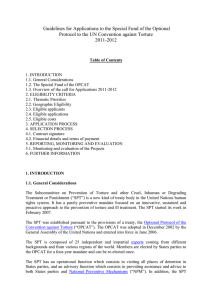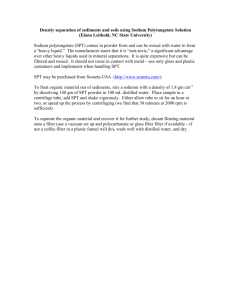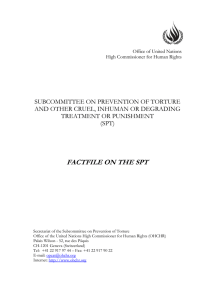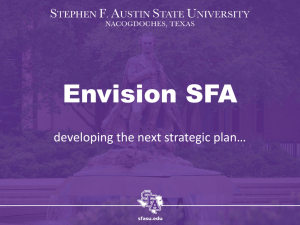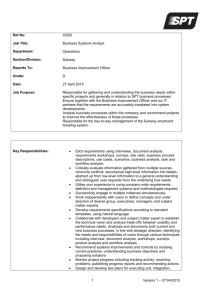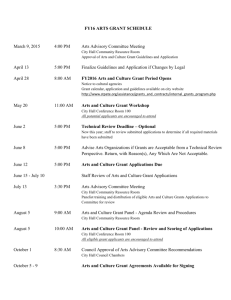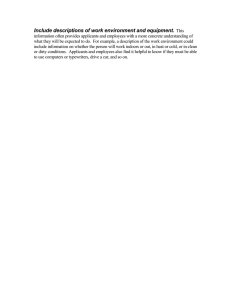Guidelines for Applications to the Special Fund of the Optional
advertisement
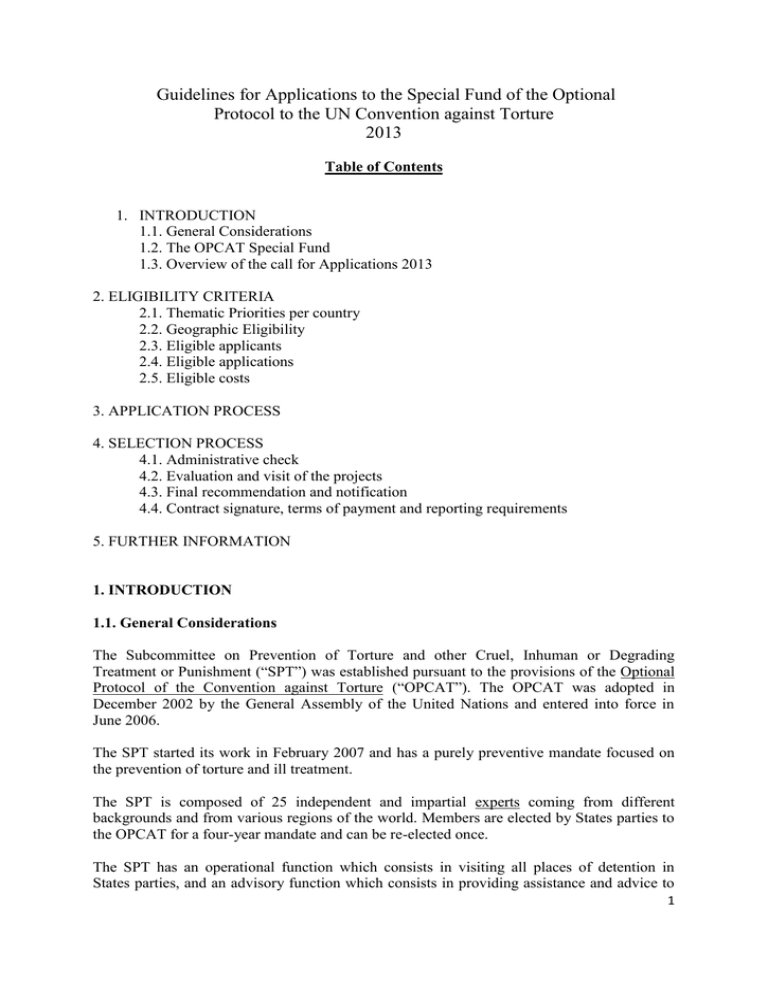
Guidelines for Applications to the Special Fund of the Optional Protocol to the UN Convention against Torture 2013 Table of Contents 1. INTRODUCTION 1.1. General Considerations 1.2. The OPCAT Special Fund 1.3. Overview of the call for Applications 2013 2. ELIGIBILITY CRITERIA 2.1. Thematic Priorities per country 2.2. Geographic Eligibility 2.3. Eligible applicants 2.4. Eligible applications 2.5. Eligible costs 3. APPLICATION PROCESS 4. SELECTION PROCESS 4.1. Administrative check 4.2. Evaluation and visit of the projects 4.3. Final recommendation and notification 4.4. Contract signature, terms of payment and reporting requirements 5. FURTHER INFORMATION 1. INTRODUCTION 1.1. General Considerations The Subcommittee on Prevention of Torture and other Cruel, Inhuman or Degrading Treatment or Punishment (“SPT”) was established pursuant to the provisions of the Optional Protocol of the Convention against Torture (“OPCAT”). The OPCAT was adopted in December 2002 by the General Assembly of the United Nations and entered into force in June 2006. The SPT started its work in February 2007 and has a purely preventive mandate focused on the prevention of torture and ill treatment. The SPT is composed of 25 independent and impartial experts coming from different backgrounds and from various regions of the world. Members are elected by States parties to the OPCAT for a four-year mandate and can be re-elected once. The SPT has an operational function which consists in visiting all places of detention in States parties, and an advisory function which consists in providing assistance and advice to 1 both States parties and National Preventive Mechanisms (“NPM”). In addition, the SPT cooperates, for the prevention of torture in general, with the relevant United Nations organs and mechanisms as well as with international, regional, and national institutions or organizations. The SPT presents a public annual report on its activities to the Committee against Torture and convenes three times a year for sessions of one week duration at the United Nations Office at Geneva. At the end of its country visits, the SPT communicates its recommendations and observations to the State by means of a confidential report, and if necessary, to the NPMs. However, States parties are encouraged to request the SPT to publish the visit reports. Since its establishment, the SPT has visited the following countries (in chronological order): Mauritius Maldives Sweden Benin Mexico Paraguay Honduras Cambodia Lebanon Bolivia Liberia Ukraine Brazil Mali Argentina The following States Parties have requested the SPT to publish their respective visit reports (in alphabetical order): Benin Brazil Honduras Maldives Mexico Paraguay Sweden 1.2. The OPCAT Special Fund The Special Fund (hereinafter: “the Fund”) was established pursuant to article 26 of the Optional Protocol to the UN Convention against Torture. The overall purpose of the Fund is to help finance the implementation of the recommendations made by the SPT after a visit to a State party to the Optional Protocol, as well as education programmes of NPMs. The Fund receives voluntary contributions from governments, intergovernmental and non-governmental organizations and other private or public entities. 2 The Fund is managed by the United Nations Office of the High Commissioner for Human Rights (hereafter, the “Fund Manager”), in conformity with the United Nations Financial Rules and Regulations and the relevant policies and procedures promulgated by the Secretary-General. The SPT agreed on an interim scheme for the first Call for Applications and the Call for Applications-2013, to be administered by the Fund Manager via its Grants Committee. 1.3. Overview of the Call for Applications 2013 The Call for Applications for 2013 will accept project applications from eligible applicants aimed at implementing recommendations made by the SPT after a visit to a State party, provided these recommendations are contained in a report that has become public by the request of the State party. Applicants may request grants of up to US$ 50,000 for project applications implemented between 1 January 2013 to 31 December 2013. The Fund Manager reserves the right to earmark part of the totality of a grant to specific budget lines. For 2013, thematic priorities per country have been identified (see table below). In addition, projects addressing any other specific recommendation in the visit reports that details a pressing and compelling need could be considered. All applications must be submitted in English, French or Spanish. The final number of grants awarded will depend on the proposed budgets of selected project applications, as well as the financial resources of the Fund. The Call for Applications 2013, will close on 15 October 2012 at 24:00 CET. Call for Applications 2013 - Thematic Priorities per country Benin Notifications of fundamental rights to detainees in a language which they can understand; Safeguards against torture and cruel, inhuman and degrading treatment in police custody, including training to law enforcement personnel; Developing standardized and unified police records; Reduction of overcrowding in places of detention through the processing of cases of remand detainees and the development of a computer based programme, allowing monitoring the state of legal proceeding for pre-trial detainees and the date of release of sentenced detainees. Educational activities for prisoners, in particular women and children. Brazil Notifications of fundamental rights to detainees in a language which they can understand; Developing standardized and unified police records; Developing training programmes for detention personnel; Promoting detainees’ right to legal counsel, including the development of a public defender’s central register of allegations of torture and ill-treatment. 3 Honduras Strengthen and support to the NPM; Notifications of fundamental rights to detainees in a language which they can understand; Safeguards against torture and cruel, inhuman and degrading treatment in police custody, including the development of standardized and unified police records. Fight against impunity, including legislative reform and the strengthening of the capacity and independence of investigative organs. Implementation of the new law on the penitentiary system; Maldives Notifications of fundamental rights to detainees in a language which they can understand; Safeguards against torture and cruel, inhuman and degrading treatment in police custody, including training to law enforcement personnel and the development of a nationwide complaints register; Developing standardized and unified police records; Structuring medical routine examination, including the proper recording and assessment of injuries and the provision of training on the use of the Istanbul Protocol. Ensuring that disciplinary measures conform to international human rights standards. Mexico Notifications of fundamental rights to detainees in a language which they can understand; Fight against impunity, including the strengthening of the capacity and independence of investigative organs and the effective use of the Istanbul Protocol; Safeguards against torture and cruel, inhuman and degrading treatment in police custody, including the abolishment of the practice of arraigo; Strengthening the preventive role and mandate of the Ombudsman. Strengthen and support of sentence enforcement courts. Paraguay Strengthen and support to the NPM; Notifications of fundamental rights to detainees in a language which they can understand; Safeguards against torture and cruel, inhuman and degrading treatment in police custody, including avoiding prolonged periods of police custody. Promoting detainees’ right to legal counsel from the very outset of deprivation of liberty and during all stages of criminal proceedings. Fight against impunity, including the strengthening of prosecutors’ capacity to investigate torture cases and the provision of training on the Istanbul Protocol. Sweden Strengthen and support to the NPM; Safeguards against torture and cruel, inhuman and degrading treatment in police custody, including access to interpretation; Regulating restrictions to remand detainees according to international human rights standards; Structuring medical routine examination, including screening of suicidal risk; 4 2. ELIGIBILITY CRITERIA 2.1. Thematic Priorities per country During its 17th session held in Geneva from 18 to 22 June 2012, the SPT has identified recommendations in respect of which applications will be considered for the Call for Applications 2013, for each eligible country. Only applications relating to recommendations contained in published SPT visit reports, and focussing on country thematic priorities, as determined by the SPT in plenary, will be considered. All project applications should respond to at least one of the above country thematic priorities for 2013, but do not necessarily have to address all. 2.2. Geographic Eligibility Only applications relating to recommendations contained in the SPT visit reports that have been published, and hence are no longer confidential, will be considered at this stage. Therefore, the Call for Applications 2013 is limited to projects to be implemented in the following countries: Benin Brazil Honduras Maldives Mexico Paraguay Sweden Within the criteria highlighted above, all applications will be given fair and equitable consideration regardless of the geographic location of the applicant or the location of the proposed activities. 2.3. Eligible applicants As a rule, applications may be submitted by: States parties having been visited and having agreed to the publication of the SPT report. National Preventive Mechanisms of these States parties. Applications may be submitted as well by National Human Rights Institutions (NHRI), if compliant with the Paris Principles and by Non-Governmental organizations (NGO), in particular if the proposed projects are implemented in cooperation with eligible States parties and/or NPMs. 5 2.4. Eligible applications A project is a coherent set of activities with defined operational objectives, target groups, planned outcomes and detailed related costs per activity. A project must achieve specific aims and accomplish expected results within a limited timeframe. Projects should be designed in response to the specific needs of the identified target group(s). Eligible project applications under the current Call for Applications will have a maximum duration of 12 months, beginning not earlier than 1 January 2013 and ending no later than 31 December 2013. Eligible applications should not exceed a request of up to US$50,000. Only one application per applicant can be considered admissible. The Fund Manager encourages applicants to reflect on the following basic principles: • A human rights-based approach; • Partnership with other stakeholders; • Project design with the potential for replication; • Sustainability; The Fund seeks to identify good practices and sustainable projects. The Fund encourages projects to be financed from multiple sources. 2.5. Eligible costs Only eligible costs can be taken into account. These costs must: Be necessary for carrying out the project activities; Have actually been incurred by the applicant during the implementation period; Comply with the principles of sound financial management, in particular value for money and cost-effectiveness; Be recorded in the applicants’ accounts or tax documents, be identifiable and verifiable and be backed by original supporting documents. Subject to these conditions, eligible direct costs should correspond to market local rates and include: The cost of staff assigned to the project. CVs of staff to be paid under the Fund’s grant should be attached to the application as well as detailed terms of references of the staff involved in the project. Salaries can be only covered if the tasks to be performed are essential to the implementation of the project’s activities. Procurement of materials and equipment strictly essential for the achievement of the objectives of the project. The cost of consumables and supplies. The cost of travel and accommodation for participants to trainings. Any other relevant cost deemed essential for the achievement of the objectives of the project. 6 First time grantees should include in their budget a line for an independent audit of the financial accounts related to the use of the grant. The Fund Manager may randomly select grantees for an independent audit regardless the number of the grants received in the past. An estimate of all activity costs, including audit costs, needs to be provided using the attached budget template. The Fund Manager reserves to right to earmark part of the totality of a grant to specific budget lines. For those projects to be financed from multiple sources, information on other sources of funding should be provided. Indirect costs (overheads) as a lump sum are not eligible. Other ineligible costs are: • Debts and provisions for losses; • Interest owed; • Items already financed in another framework, project or by another donor; • Currency exchange losses; • Contingency reserve. The proposed costs must be realistic. Any excessive, unrealistic or unjustified estimation will exclude the project from financing. For the approval of a new grant, the previous project must have been completed and satisfactorily implemented by the grantee. 3. APPLICATION PROCESS The Call for Applications 2013 will be issued on 15 August 2012. Applicants have two months to complete the application form, as the deadline for applying is set at 15 October 2012. No applications will be accepted after the deadline has passed but the Fund Manager encourages early submission of applications. Applications may be submitted in English, French or Spanish. However, the Fund Manager encourages submission of applications in English. Applications should be submitted by email, within the established deadline, to the following address: opcatfund@ohchr.org Applicants wishing to submit applications on paper should use the following address, within the established deadline: Optional Protocol to the Convention against Torture (OPCAT) –- Special Fund Secretariat Human Rights Treaties Division (HRTD) Office of the United Nations High Commissioner for Human Rights (OHCHR) Palais Wilson - 52, rue des Pâquis CH-1201 Geneva (Switzerland) Mailing address UNOG-OHCHR CH-1211 Geneva 10 (Switzerland) Tel.: +41 22 917 97 72 Fax: +41 22 917 90 08 E-mail: opcatfund@ohchr.org 7 State Party applicants should transmit a copy of their application, for information, to their Permanent Mission in Geneva. Application information (including this document, the Application Form and the Budget Form) will be available on the website of the SPT: http://www2.ohchr.org/english/bodies/cat/opcat/index.htm The project proposal shall be written clearly and accurately and shall not exceed 10 full pages (size A4), including the budget. All fields must be completed in order for the project to be considered for funding. Applicants have the option of submitting a Letter of Reference to support their application. This letter can take any form, and can be provided by any individual/institution who you feel may support your application for funding. A letter of reference is not required, but if desired, the letter must be submitted at the time of application. 4. SELECTION PROCESS The application process will end on 15 October 2012 at 24:00 CET. The applications will be evaluated and considered for funding by the Fund Manager and its Grants Committee. The evaluation of the applications will be carried out according to the following steps: 4.1. Administrative check The Fund Manager through the Fund’s Secretariat will perform administrative checks of applications as they are received. Applications will not be further considered if: The application does not meet with the geographic criteria set up in section 2.2. of this Guidelines; The application was received after 15 October 2012. At this stage, no notifications will be sent to applicants. 4.2. Evaluation and visit of the projects An extensive evaluation of the quality of applications, including the enclosed budget will be carried out by the Fund’s Secretariat in accordance with pre-set evaluation criteria. For assessing first-time applicants’ capacity to implement the projects, field visits to the projects could be conducted by the Fund’s Secretariat or by UN field presences. For the evaluation of projects, the Fund’s Secretariat will take into consideration recommendations given by SPT members and UN staff in the field presences. 8 4.3. Final recommendation and notification All applications deemed “admissible” after the administrative check conducted in accordance with Section 4.1. of this Guidelines, will be further submitted for consideration of the OHCHR Grants Committee. The OHCHR Grants Committee will review applications based on the same evaluation criteria used by the Fund’s Secretariat and will take the final decision on the approval of the grants. Following final recommendations by the OHCHR Grants Committee, the Fund’s Secretariat will then ensure that all recommended applications satisfy the technical requirements, rules and regulations of the United Nations. Upon confirmation of the Grants Committee’s recommendations, applicants will be informed about the status of their application. Once the 2013 project cycle is completed, the list of selected projects will be published in the OHCHR web page. 4.4. Contract signature, terms of payment and reporting requirements. Selected applicants (hereinafter referred to as “grantees”) will be offered a contract (Grant Agreement) to be signed with OHCHR. Conditions on the use of the grant and reporting requirements are specified in the Grant Agreement. Indeed, two months after the completion of activities, all grantees have to submit to the Fund Manager a final report of activities and a final statement of expenditures. For projects of an implementation period of 12 months, mid-term reporting is required. However, if the Fund Management deems appropriate, mid-term reporting may be required, regardless the project’s implementation duration. Grant payments are made by bank transfer in the name of grantee’s organization or through the UNDP country office. As customary for OHCHR grants, 80% of the grant will be paid upon signature of the Grant Agreement and the remaining 20% upon receipt of satisfactory final narrative and financial reports. 5. FURTHER INFORMATION Any questions regarding the application process for the Call for Applications 2011-2012 may be sent to the following e-mail address: opcatfund@ohchr.org. The Fund will not give prior opinion on the eligibility of applicants or projects nor will it respond to individual inquiries regarding project selection. 9
